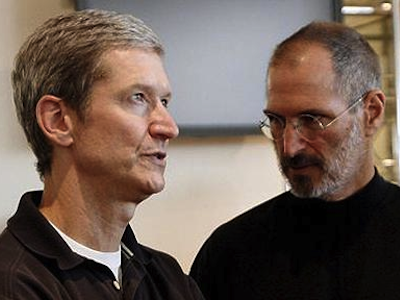Tim Cook Refused to Sue Samsung, Overruled by Steve Jobs
Current Apple CEO Tim Cook is said to have refused to sue the firm's chief competitor, Samsung, but he was overruled by the late Apple co-founder Steve Jobs.
Cook, who succeeded Jobs as chief executive after seven years as the firm's chief operating officer, objected to a lawsuit against Samsung, as the South Korean technology company supplied components for Apple's iPhone and iPad, according to Reuters' sources. The former was the only company who could meet Apple's demands in a set amount of time.
Apple is believed to have paid Samsung $8 billion last year to purchase chips and screens for the two aforementioned iOS devices. Following a deal related to flash memory in 2005, both technology titans formed a close relationship, which saw the grandson of Samsung's founder visiting Jobs at his home in California. Apparently, the partnership gave each company an insight into its operations.
However, following the launch of the Galaxy S in 2010, both Jobs and Cook complained to Samsung executives regarding the smartphone's look; Apple expected it to modify its design. Believing that Samsung was dependent on its position as a key components supplier to protect itself from legal repercussions, Jobs retaliated when Samsung launched the Galaxy Tab in 2011.
Apple filed a patent infringement lawsuit against the company during April 2011 in order to ban several Samsung devices in the U.S. It culminated in a $1.05 billion court case win for the iPhone maker, but Apple ultimately failed in its effort to apply sales bans. The latter had its request to triple said amount denied as the judge ruled that Samsung didn't willingly infringe on its competitor's patents. That said, the judge denied Samsung's request for a new trial related to the August ruling. Both companies will now face each other in court for another mega trial during March 2014.
Elsewhere, amid reports that Apple is starting to look at alternatives for chip production, the South Korean manufacturer is planning to diversify its chip business.
Contact Us for News Tips, Corrections and Feedback
Get Tom's Hardware's best news and in-depth reviews, straight to your inbox.

Zak Islam is a freelance writer focusing on security, networking, and general computing. His work also appears at Digital Trends and Tom's Guide.
-
dozerman Assuming this story is true (and there is really no way to confirm that it is), I would have to say that I have slightly more respect for Apple now.Reply -
derekullo Apple pays Samsung to make parts for iPhone.Reply
Apple patents smart phones.
Samsung makes smart phone for itself.
Apple sues Samsung for trying to cut into business. -
freggo The lawsuit was a PR victory for Samsung as Apple basically told the world that they welt the Samsung phones are serious competition; i.e. as good -if not better- than an iPhone.Reply
Seeing what this tech companies budget in PR funds that Billion may have been well worth it; and prob. has not even been paid yet anyway.
-
house70 Even if this is true, Cook had enough time to drop this BS. He didn't, so he's as much to blame as his predecessor.Reply
victoroliviaspam taken outZak's articles are the most spammed. I guess no filter for spam is OK in his opinion. -
capt_taco Apple: "Hello, Samsung? We need parts for our iPhones."Reply
Samsung: "OK, that'll be $7 billion please."
Apple: "By the way, we're suing you for a billion dollars."
Samsung: (pause) ... "But you still want the parts?"
Apple: "Yes."
Samsung: "OK, that'll be $8 billion please."
-
WyomingKnott Reply
The author doesn't filter spam. Maybe Zak has the most popular articles, so they are the most efficient place to go spamming?10435046 said:Even if this is true, Cook had enough time to drop this BS. He didn't, so he's as much to blame as his predecessor.
Zak's articles are the most spammed. I guess no filter for spam is OK in his opinion. -
ikyung AndrewMDSince Samsung had so much insight into what went into an Apple product at the time, Samsung entering the smartphone business was a mistake they took. Actually, I doubt Apple would have sued them if their phones did not look like an Apple product to begin with.This reminds me about Hyundai's entry into the entry-level luxury market with their first Almati, it was then during the German auto show a Mercedes's rep commented thinking that Mercedes completed their showing of new cars only to be shocked that Hyundai copied their iconic front-end design for their own car. It seems that Asians have an issue creating a unique product to wow the world, only know how to copy an existing product....So you use two examples within a single time period to exemplify an entire race of people. The way technology works is it evolves horizontally as well as vertically. Innovation and iteration. So.. since China built the first cannon dating back more then a hundred years before Europe, does that mean any device that uses gun powder to shoot projectiles are copies? No it doesn't. Because cannons built in Europe were more efficient, accurate, and powerful. They took an idea and functionality of something that already existed and made it better. That is called iterating.Reply
Samsung already stated in an interview that they let the market drive them unlike Apple's philosophy of they drive the market because consumers don't know what they want. So when the smartphone market was established, Samsung took an existing product and added things that Apple didn't offer. Like SD card slots, removable batteries, Android OS, bigger screens, etc. Of course back in 2010 when Galaxy S first launched, it wasn't as popular. The reason for it was the masses didn't really understand what a Smartphone was capable of so they wanted something easy that just made calls, texts, etc. As the market matures, so does the consumers of the market. They started looking for more features which is why the S2 and S3 became more popular. -
A Bad Day One does not simply screw with Mr. Jobs.Reply
One of the previous suppliers back in Apple's early years was bold enough to tell him that they will delay shipments whenever they like because there was nothing in the contract prohibiting it.
He immediately broke the contract and ate a lawsuit from the supplier to set an example of his intolerance of BS towards him.
